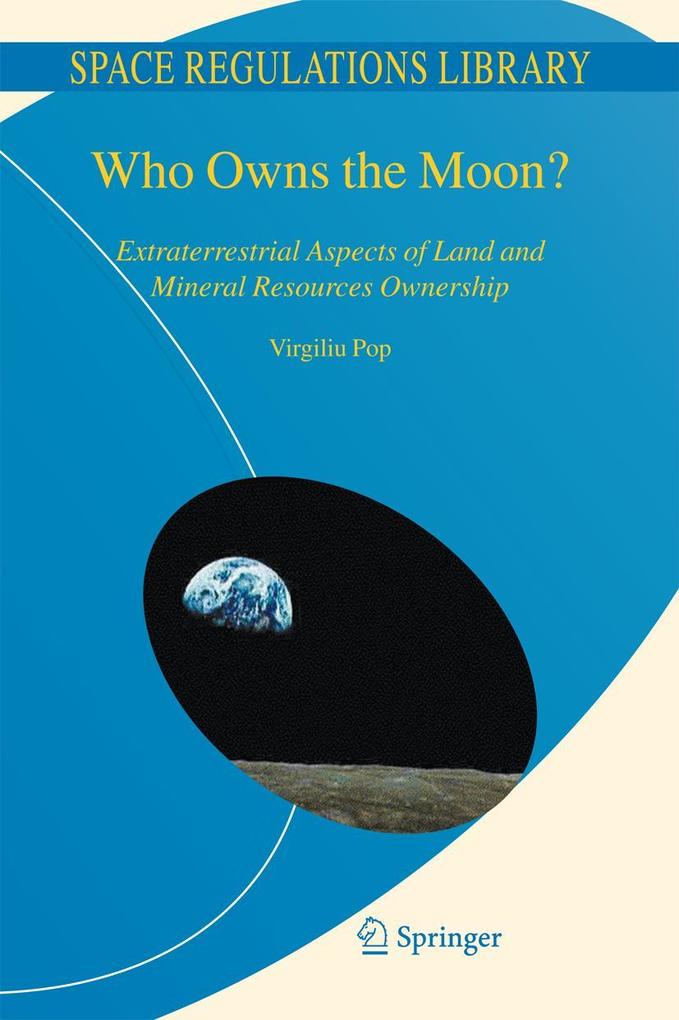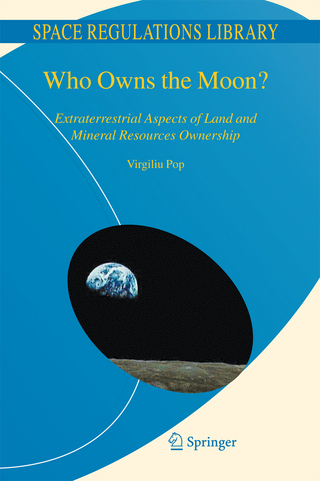
ISBN: 9781402091346
This work investigates the permissibility and viability of property rights on the - lestial bodies, particularly the extraterrestrial aspects of land and mineral resources ownership. In l… Mehr…
| Springer.com new in stock. Versandkosten:zzgl. Versandkosten. (EUR 0.00) Details... |

ISBN: 9781402091346
This work investigates the permissibility and viability of property rights on the - lestial bodies, particularly the extraterrestrial aspects of land and mineral resources ownership. In l… Mehr…
| Springer.com Nr. 978-1-4020-9134-6. Versandkosten:Worldwide free shipping, , DE. (EUR 0.00) Details... |

2008, ISBN: 9781402091346
*Who Owns the Moon?: Extraterrestrial Aspects of Land and Mineral Resources Ownership* - Extraterrestrial Aspects of Land and Mineral Resources Ownership. Auflage 2008 / gebundene Ausgabe… Mehr…
| Hugendubel.de 1402091346. Versandkosten:Shipping in 7 days, , Versandkostenfrei nach Hause oder Express-Lieferung in Ihre Buchhandlung., DE. (EUR 0.00) Details... |

Who Owns the Moon? Extraterrestrial Aspects of Land and Mineral Resources Ownership 2008 - gebrauchtes Buch
2008, ISBN: 9781402091346
2008 Neubindung, A:2009 4680225/12 Versandkostenfreie Lieferung Space Law,Moon Agreement,extraterrestial,Outer Space Treaty,moon treaty,International Space Law,mining the moon,ownership,P… Mehr…
| buchfreund.de |

2008, ISBN: 9781402091346
Extraterrestrial Aspects of Land and Mineral Resources Ownership, Buch, Hardcover, 2008 ed. [PU: Springer-Verlag New York Inc.], Springer-Verlag New York Inc., 2008
| lehmanns.de Versandkosten:Versand in 10-14 Tagen. (EUR 9.95) Details... |

ISBN: 9781402091346
This work investigates the permissibility and viability of property rights on the - lestial bodies, particularly the extraterrestrial aspects of land and mineral resources ownership. In l… Mehr…
ISBN: 9781402091346
This work investigates the permissibility and viability of property rights on the - lestial bodies, particularly the extraterrestrial aspects of land and mineral resources ownership. In l… Mehr…

2008
ISBN: 9781402091346
*Who Owns the Moon?: Extraterrestrial Aspects of Land and Mineral Resources Ownership* - Extraterrestrial Aspects of Land and Mineral Resources Ownership. Auflage 2008 / gebundene Ausgabe… Mehr…

Who Owns the Moon? Extraterrestrial Aspects of Land and Mineral Resources Ownership 2008 - gebrauchtes Buch
2008, ISBN: 9781402091346
2008 Neubindung, A:2009 4680225/12 Versandkostenfreie Lieferung Space Law,Moon Agreement,extraterrestial,Outer Space Treaty,moon treaty,International Space Law,mining the moon,ownership,P… Mehr…

2008, ISBN: 9781402091346
Extraterrestrial Aspects of Land and Mineral Resources Ownership, Buch, Hardcover, 2008 ed. [PU: Springer-Verlag New York Inc.], Springer-Verlag New York Inc., 2008
Bibliographische Daten des bestpassenden Buches
| Autor: | |
| Titel: | |
| ISBN-Nummer: |
Detailangaben zum Buch - Who Owns the Moon?: Extraterrestrial Aspects of Land and Mineral Resources Ownership
EAN (ISBN-13): 9781402091346
ISBN (ISBN-10): 1402091346
Gebundene Ausgabe
Taschenbuch
Erscheinungsjahr: 2008
Herausgeber: SPRINGER NATURE
176 Seiten
Gewicht: 0,435 kg
Sprache: eng/Englisch
Buch in der Datenbank seit 2008-12-30T20:26:10+01:00 (Berlin)
Detailseite zuletzt geändert am 2023-10-04T21:26:29+02:00 (Berlin)
ISBN/EAN: 9781402091346
ISBN - alternative Schreibweisen:
1-4020-9134-6, 978-1-4020-9134-6
Alternative Schreibweisen und verwandte Suchbegriffe:
Autor des Buches: pop, virgil
Titel des Buches: the who, moon space, land resources, space own, the moon below, mineral, aspects the novel, maybe the moon, first moon, who owns whom, look the moon
Daten vom Verlag:
Autor/in: Virgiliu Pop
Titel: Space Regulations Library; Who Owns the Moon? - Extraterrestrial Aspects of Land and Mineral Resources Ownership
Verlag: Springer; Springer Netherland
176 Seiten
Erscheinungsjahr: 2008-12-01
Dordrecht; NL
Gedruckt / Hergestellt in Niederlande.
Sprache: Englisch
160,49 € (DE)
164,99 € (AT)
177,00 CHF (CH)
POD
XII, 176 p.
BB; Hardcover, Softcover / Physik, Astronomie/Astronomie; Astronomie, Raum und Zeit; Verstehen; International Space Law; Moon Agreement; Outer Space Treaty; Property rights; Space Activities; Space Law; extraterrestial; mining the moon; moon treaty; ownership; resources; Astronomy, Cosmology and Space Sciences; International Economic Law, Trade Law; Law of the Sea, Air and Outer Space; Aerospace Technology and Astronautics; Astronomy, Observations and Techniques; Law and Economics; Internationales Öffentliches Recht: Wirtschafts- und Handelsrecht; Internationales Öffentliches Recht und Völkerrecht; Luft- und Raumfahrttechnik; Astronautik (Raumfahrttechnik); Astronomische Beobachtung: Observatorien, Ausrüstungen und Methoden; Wirtschaftswissenschaft; Recht; EA; BC
Is the Moon for Sale?.- The Sources of Landed Property Rights in Outer Space.- The Object of Landed Property Rights in Outer Space.- The Relationship Between Property and Sovereignty in Outer Space.- The Commons Regime: Everybody’s and Nobody’s.- Homesteading the Final Frontier.- The Common Heritage of Mankind: Reaping Without Sowing.- Property Status of Extraterrestrial Samples and Extracted Resources.- Conclusion.Written by a specialist in the field Investigates the permissibility and viability of property rights on the celestial bodies, particularly the extraterrestrial aspects of land and mineral resources ownership Includes supplementary material: sn.pub/extras
Weitere, andere Bücher, die diesem Buch sehr ähnlich sein könnten:
Neuestes ähnliches Buch:
9780861547265 Who Owns the Moon? (A. C. Grayling)
< zum Archiv...

